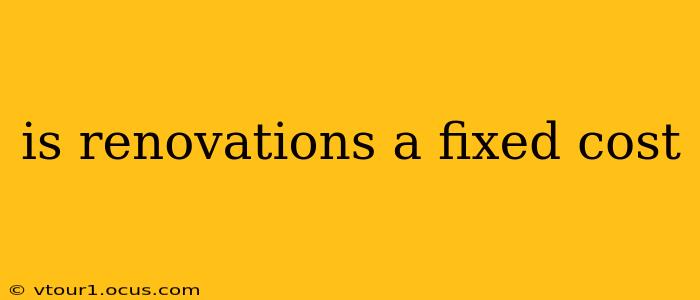Is Renovations a Fixed Cost? Unpacking the Complexity of Renovation Budgeting
The short answer is: no, renovations are not a fixed cost. While you'll have a planned budget, numerous factors can impact the final cost, making it more accurate to consider renovations as a variable cost. This means the total expense can fluctuate significantly throughout the project. Understanding this variability is crucial for successful home renovation planning.
This article will delve into the reasons why renovation costs are rarely fixed, examining common cost overruns and offering strategies for better budget management.
What Factors Make Renovation Costs Variable?
Several elements contribute to the unpredictable nature of renovation expenses:
-
Hidden Problems: This is perhaps the biggest culprit. During demolition or initial stages, unexpected issues like water damage, faulty wiring, asbestos, or structural problems can surface, significantly increasing the project cost. These hidden issues are difficult, if not impossible, to account for accurately during the initial planning phase.
-
Material Price Fluctuations: The cost of building materials can change dramatically due to market conditions, supply chain disruptions, and even seasonal variations. A delay in the project can lead to a considerable increase in material costs.
-
Scope Creep: This is the tendency to expand the project beyond the initial plan. What starts as a simple kitchen remodel might evolve to include new appliances, upgraded flooring, or even a complete room redesign. This expansion inevitably increases the total cost.
-
Labor Costs: Labor rates vary depending on the region, the type of work, and the experience of the contractor. Unexpected delays or the need for specialized skills can drive up labor expenses.
-
Permitting and Inspection Fees: These fees are often underestimated and can vary based on location and the extent of the renovation.
-
Contingency Planning: A wise approach includes a contingency budget (typically 10-20%) to absorb unexpected costs. However, even with a contingency, unforeseen problems can exhaust it.
What are the Fixed Costs Involved in Renovations?
While the overall project cost is variable, some aspects can be considered fixed at the outset:
-
Initial Design Fees: Architectural or design plans usually have a predetermined price.
-
Permits (Sometimes): Permit costs are generally fixed once approved, although delays can incur additional fees.
-
Certain Materials (with pre-purchase): If you buy all materials upfront, their cost is fixed (though material price increases can impact later projects).
How Can I Better Manage Renovation Costs?
Effective cost management is key to a successful renovation:
-
Detailed Planning: Thorough planning, including detailed blueprints and material specifications, minimizes scope creep and unexpected issues.
-
Multiple Bids: Obtain bids from at least three different contractors to compare pricing and services.
-
Realistic Budget: Create a realistic budget that includes a substantial contingency fund.
-
Regular Communication: Maintain open communication with your contractor to address any changes or issues promptly.
-
Phased Approach: Consider a phased approach to break down the project into smaller, more manageable stages, allowing for better cost control.
Is it possible to have a fixed price contract for renovations?
While some contractors offer fixed-price contracts, these are often less common for large-scale or complex renovations due to the inherent unpredictability discussed above. Fixed-price contracts typically come with limitations, and unexpected issues may lead to disputes and additional costs.
Renovations are inherently complex, and while careful planning and budgeting are essential, complete cost certainty is difficult to achieve. Understanding the factors that contribute to variable costs empowers you to make informed decisions and navigate the renovation process more effectively.
